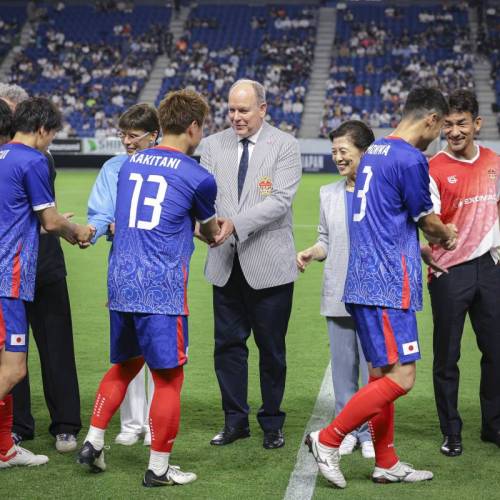Monaco-based parents are often successful and accomplished people. They all strive to raise prosperous, sometimes even perfect children. We must admit, however, that there is no perfection when setting out on a mission of just raising an individual adapted to this modern, rapidly changing world.
Some general principles, rules and educational methods obviously apply. A number of books are written on this subject. You would think, just follow the advice and go for it. But in addition to upbringing, more factors, like genes and environment, account for a child’s development. Character and health, his inclinations and the environment must all be taken into account.
From a «Martian’s point of view», the Principality conveys a sense of an extraordinary lightness and holiday-like atmosphere. Breakfasts, lunches and dinners out, shopping, all kinds of entertainment and strolling around… Children don’t ever see anybody work, except for waiters, drivers, builders and concierges. These are people of a different circle, however. The young ones struggle to understand what kind of efforts are being made by their parents to maintain them in the living standard they are used to.

For raising children in Monaco, it is therefore important to keep in mind 3 basic concepts: setting out boundaries, conveying responsibility and passing on values.
Setting Boundaries With Children
Children need boundaries, some framework of what’s doable and what’s not, a behaviour pattern to stick to. If we don’t set them out, the child will struggle to do it himself. It would then be a painful path of trial and mistakes; very pricey for him and his parents alike.
Most of the time, we are only forced to get down to it when the young ones have already «lost the plot» and their behaviour is becoming intolerable. The thing is, we should be anticipating the «thunderstorm» instead, introducing rules and boundaries well in advance, expanding them gradually.
Children need to have a concept of «natural consequences». It is for him/her to answer for their actions and correct their mistakes. You’ve made a mess, tidy up. You’ve been rude, apologize. You’ve spent a two-week allowance in one week, that’s it. If violating the rules does not have consequences, it’s as if they never existed. The child will carry on in the same way. He shouldn’t live in an artificial paradise, sheltered from the rest of the world, but raised with a concept of social integration.

It is important to teach your loved ones the boundaries. A young child believes that the world revolves around him. Everyone is looking after him and serving him. Eventually, he needs to give up the illusion of being the centre of the universe. It must be made clear that people around him, at home and outside, have their own lives, interests and ideas. No matter what they do, whether he knows them or not, basic rules of politeness apply. Say «thank you», «please», «sorry», «may I», «hello», «goodbye». Don’t take other people’s things without asking, don’t be rude; say thank you for a gift.
Help your child work on his self-control. It is our responsibility to channel our child’s needs, avoid satisfying his every whim — not only in terms of goods, but also entertainment. If he is pestering you for something, say no, firmly. He will respect you even more knowing that «no» actually means «no», no matter what your mood is today or the weather outside.
I do tell parents every time that, most importantly, we need to learn self-control. We need to observe how we set out the boundaries in everyday life, in our relationships with children and other people. It is the family that conveys the very first concept of what the world is all about. Setting out and following the rules, we determine the child’s way of living. He will naturally adhere to them. And the likelihood of him growing independent and resistant to obstacles, increases significantly.

Important Lesson: Responsibility for Kids
«Responsibility» stands for several concepts: duty, reliability, carrying out the mission you’ve started on. A truly responsible person masters his feelings, desires, decisions and actions. This is an adult answering for himself, for his family, understanding that no one owes him anything. It is a social responsibility that wealthy and power-endowed individuals possess.
In pre-revolutionary Russia, wealthy families were teaching their children the responsibility for people in need from early on. If you think about Nicolas II’s daughters, at the outbreak of WWI, the Grand Duchesses, alongside Empress Alexandra Feodorovna, were working in hospitals as sisters of mercy. They looked after the wounded and assisted with operations.
There used to be a culture of charity. Wealthy people would bring their children to visit poor homes and provide some serious help. They organized meals and distributed clothes at their own expense. Charity was considered an honourable affair, people would queue to donate.

In today’s Europe, royals are raised to serve in the army, assist disabled children, work in medical institutions and hospices. The young ones are made to understand: the more privileges you have, the more responsibility you carry. That’s how they know exactly where they stand.
Another remarkable example from recent history, is how Princess Sofia, the ruling Queen of Spain was raised. The girl used to live in a boarding house with Spartan conditions: cold water, meagre food, severe punishment for misconduct. Four years later, her parents took her travelling to poor countries. She witnessed the life of the local children and was providing them help. Later on, Sofia got qualified as a nurse and was looking after the sick. Her parents thus did their best to raise her responsibly and consciously using the truly amazing opportunities of a royal title.

As to Prince William, he also attended a boarding school, sharing a bedroom with four other boys. Upon his graduation from Eton College, he travelled the world and took part in charity events in Chile and Africa. In 2015, William became an ambulance helicopter pilot. He is devoting much of his time to charity, chairing a number of foundations.
To break the circle of feeling being one of the chosen and a sense of elitism, we need to develop a sense of responsibility and empathy in our children. They need to understand that we all share the same world. People are different, with different lives, but everyone deserves respect regardless of their education, wealth, abilities or health. Don’t strike the weak, don’t humiliate the poor, help those in need. Understanding and being compassionate — that’s their duty towards those who live differently.

Passing on Values to Your Kid
It is not just money, property and other material values that children inherit. They also take in our system of values guiding their decisions. We pass it on without even thinking, through our comments, discussions and behaviour.
Surely, even despite the lack of time, we all know how to share our values with children. It was the same for me, working hard and spending little time at home. I am a mother of three, they are now adults. I do believe that I managed to pass on my system of values to them. My children still quote me: «What if a fire burnt down our house and we found ourselves in the street? What do we have left? Our loved ones, health, knowledge, experience. This is what is most important, worth investing in and cherishing».

Raising a child in an atmosphere of lightness and idleness is certainly challenging. That is why setting boundaries, conveying responsibility and passing on values in the family is vital. The child soaks up this atmosphere and then knows exactly why he is getting that much pocket money: «Because that’s the way it is in our family». End of discussion.









